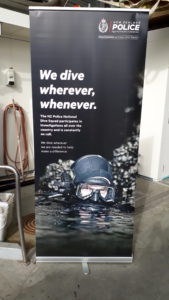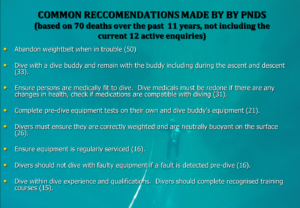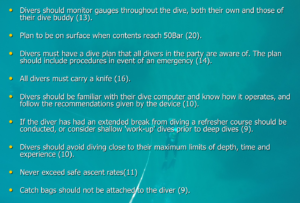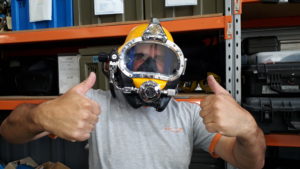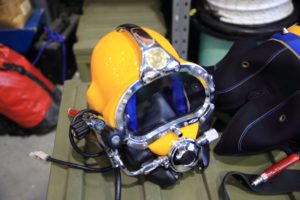After a successful event 2 years ago the Police National Dive Squad approached us about running another information evening for our dive club, about the role they play in New Zealand & how we has divers can keep ourselves safer in the water.
“As part of our goals to making New Zealand a safer country we would like to increase awareness about diving safety. By sharing about what we do and common issues we find during our diving fatality investigations we can help divers avoid these issues, get the most out of their dives and most importantly to get home safely.” PNDS
This sound like a great idea and we headed down to the Dive Squad’s base in Seaview after work for a chat with their divers.
1. Diver Deaths:
We first discussed the main causes of diving deaths in New Zealand and the key message is to dive with a buddy and be prepared to ditch your weights in an emergency – you can always go back for a weight belt!
Diver deaths are investigated by the Dive Squad and the information sent off to the Coroner. The PNDS make their recommendations as follows. The number in brackets indicate the number of times this factor may have led to the death.
There is never a single cause and it may not always be possible to determine one factor that leads to the loss. Most incidents have a number of factors that when combined have fatal consequences.
We can go online to see some of the released findings from the Coroner’s Office – Coronial Findings
We had an interesting conversation on these contributing factors and how we can avoid them – Yes – training, medicals, gear servicing and recent experience all play a important role but one of the key things we can do to keep ourselves and our buddies safe is to be honest about the dive and how well prepared we are for it.
We say that ‘anyone can call a dive at any time for any reason’ but how comfortable are we in pulling the pin on a dive? How much does peer pressure to dive, to catch our quota, go deeper or the feeling that we don’t want to ruin someone else’s dive affect the decisions we make?
When we are inviting new divers along on club dives they often express concern that they are ‘ruining’ their buddy’s dive as it will be shorter, shallower or just different than the dive would be if both divers were experienced. This is true but we must remember someone dived with us when we were new and inexperienced We would all rather have a relaxed cruisy dive than push someone too far and have to deal with an out of air emergency, panic or a long surface swim. Both the new and the experienced diver need to need to work together so that everyone enjoys the dive and returns to shore keen for the next adventure.
2. Dive Equipment
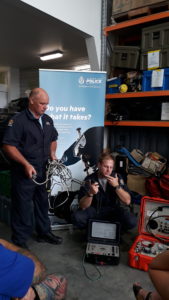 It may look similar to what we use but the PNDS have a range of equipment reserves and fail safes designed to keep them safe in often challenging conditions such fast moving waters and no visibility. The team showed us through a range of the equipment they have available for different situations.
It may look similar to what we use but the PNDS have a range of equipment reserves and fail safes designed to keep them safe in often challenging conditions such fast moving waters and no visibility. The team showed us through a range of the equipment they have available for different situations.
Conducting a wide range of searches usually for evidence they showed us their sonar equipment and the details it can pick up off the sea or lake bed.
We also looked at range of communication equipment, recall techniques and their hand help radio beacons to keep track of each diver in all situations.
We were also joined by the Police Maritime Unit on the Lady Elizabeth IV and were able to chat to the crew about the support they provide to divers in terms of searches and providing a base for the Dive Squad and other policing units.
It is an incredible boat, sleeps 10 but we couldn’t quite convince then to run a dive trip for us!
We would love to thank the Police National Dive Squad and the Maritime Unit for the evening and especially to Matthias for his enthusiasm in sharing this information with the club and for organising the night. We learnt a lot and hopefully this information will spread and keep more divers out of trouble.
